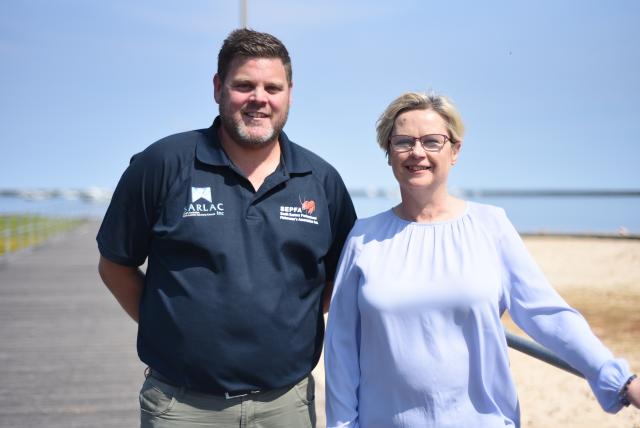
Charlotte Varcoe
MINISTER for Primary Industries Clare Scriven met with rock lobster officials at Port MacDonnell last week to discuss the current issues impacting the industry including international trade and the proposed offshore wind project.
The meeting comes off the back of both the South Australian Premier Peter Malinauskas and Prime Minister Anthony Albanese meeting with the Chinese government in recent months.
The two political leaders travelled to China to discuss a range of issues impacting the state and country including tariffs in the wine, rock lobster and timber industries.
Ms Scriven confirmed the state government was continuing to advocate behind the scenes in its opposition to offshore wind turbines off the coast of Port MacDonnell.
“As the state government said in its submission, it has very serious concerns around environmental issues and issues for the local industry, in particular the rock lobster industry,” Ms Scriven said.
“We will continue to advocate and we are hopeful the Federal Government will be open to that advocacy and we are very pleased the federal minister has been open to discussions.”
She said in the view of the state government, it was important to ensure any submission it made was “based on the evidence which was available”.
“That is why the Department of Primary Industries and Regions did the work around what the potential impacts could be and to what extent some of those impacts might be and it is important we rely on the real science,” Ms Scriven said.
“Our government is supportive of renewable energy but that cannot be at the expense of existing industries or where the impacts would be otherwise detrimental.”
Ms Scriven said the state government was also hopeful that following Mr Albanese’s visit to China there would be positive outcomes in terms of trade relationships.
“This would be a real boost for the lobster industry locally,” Ms Scriven said.
“We can see the relationship with the Chinese government is stabilising and that is very positive and certainly a testament to both the federal and state government’s efforts in this regard.
“We are hopeful and I think the industry here is certainly keen to see that progress.”
South Australian Rock Lobster Advisory Council executive officer Nathan Kimber also commented on the current issues and developments regarding the industry, stating he was pleased both the State and Federal Government had made the international trip.
“We are really pleased that both the state and federal government have been to China within the last month and have certainly raised the question about live lobster exports from Australia to China,” Mr Kimber said.
“We did not expect an immediate decision out of the Prime Minister’s trip but we are very hopeful it happens in the near future.”
Mr Kimber said he believed the relationship between Australia and China was stabilising which could only be positive for the industry.
“Obviously there have been movements with timber and barley and there have been announcements around reviewing the action for wine so it does fill us with a level of positivity that slowly but surely all of the products which have been impacted by the various trade bans are starting to come off.”
In regards to the proposed offshore wind farm, Mr Kimber said although the consultation phase had finished, industry representatives would continue to advocate behind the scenes to local members on both a state and federal level.
Mr Kimber also said there had been discussions about coexistence regarding the offshore wind farm and the industry, yet the “simple fact of the matter” was where the proposal was made.
“Where they are proposing to put that zone could not be in a worse position for our fisheries as they are areas with a really high density of lobsters and a high fishing effort,” he said.
“Our position was that offshore renewable infrastructure in that specific area they were proposing could not coexist with our fisheries.”







